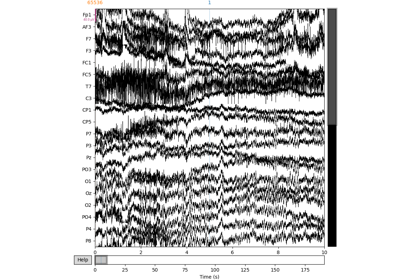mne_bids.get_entity_vals#
- mne_bids.get_entity_vals(root, entity_key, *, ignore_subjects='emptyroom', ignore_sessions=None, ignore_tasks=None, ignore_acquisitions=None, ignore_runs=None, ignore_processings=None, ignore_spaces=None, ignore_recordings=None, ignore_splits=None, ignore_descriptions=None, ignore_modalities=None, ignore_datatypes=None, ignore_dirs=('derivatives', 'sourcedata'), ignore_suffixes=None, include_match=None, with_key=False, verbose=None)[source]#
Get list of values associated with an entity_key in a BIDS dataset.
BIDS file names are organized by key-value pairs called “entities” [1]. With this function, you can get all values for an entity indexed by its key.
- Parameters:
- rootpath-like
Path to the “root” directory from which to start traversing to gather BIDS entities from file- and folder names. This will commonly be the BIDS root, but it may also be a subdirectory inside of a BIDS dataset, e.g., the
sub-Xdirectory of a hypothetical subjectX.Note
This function searches the names of all files and directories nested within
root. Depending on the size of your dataset and storage system, searching the entire BIDS dataset may take a considerable amount of time (seconds up to several minutes). If you find yourself running into such performance issues, consider limiting the search to only a subdirectory in the dataset, e.g., to a single subject or session only.- entity_key
str The name of the entity key to search for.
- ignore_subjects
str| array_like ofstr|None Subject(s) to ignore. By default, entities from the
emptyroommock-subject are not returned. IfNone, include all subjects.- ignore_sessions
str| array_like ofstr|None Session(s) to ignore. If
None, include all sessions.- ignore_tasks
str| array_like ofstr|None Task(s) to ignore. If
None, include all tasks.- ignore_acquisitions
str| array_like ofstr|None Acquisition(s) to ignore. If
None, include all acquisitions.- ignore_runs
str| array_like ofstr|None Run(s) to ignore. If
None, include all runs.- ignore_processings
str| array_like ofstr|None Processing(s) to ignore. If
None, include all processings.- ignore_spaces
str| array_like ofstr|None Space(s) to ignore. If
None, include all spaces.- ignore_recordings
str| array_like ofstr|None Recording(s) to ignore. If
None, include all recordings.- ignore_splits
str| array_like ofstr|None Split(s) to ignore. If
None, include all splits.- ignore_descriptions
str| array_like ofstr|None Description(s) to ignore. If
None, include all descriptions.Added in version 0.11.
- ignore_modalities
str| array_like ofstr|None Modalities to ignore. If
None, include all modalities.- ignore_datatypes
str| array_like ofstr|None Datatype(s) to ignore. If
None, include all datatypes (i.e.anat,ieeg,eeg,meg,func, etc.)- ignore_dirs
str| array_like ofstr|None Directories nested directly within
rootto ignore. IfNone, include all directories in the search.Added in version 0.9.
- ignore_suffixes
str| array_like ofstr|None Suffixes to ignore. If
None, include all suffixes. This can be helpful for ignoring non-data sidecars such as *_scans.tsv or *_coordsystem.json.Added in version 0.17.
- include_match
str| array_like ofstr|None Glob-style pattern(s) of directories to include in the search (i.e., each must end with
"/").None(the default) is equivalent to"**/"(search within any subdirectory of the BIDS root).Added in version 0.17.
- with_key
bool If
True, returns the full entity with the key and the value. This will for example look like['sub-001', 'sub-002']. IfFalse(default), just returns the entity values. This will for example look like['001', '002'].- verbose
bool|str|int|None Control verbosity of the logging output. If
None, use the default verbosity level. See the logging documentation andmne.verbose()for details. Should only be passed as a keyword argument.
- Returns:
Notes
This function will scan the entire
root, except for aderivativessubfolder placed directly underroot.References
Examples
>>> root = Path('./mne_bids/tests/data/tiny_bids').absolute() >>> entity_key = 'subject' >>> get_entity_vals(root, entity_key) ['01'] >>> get_entity_vals(root, entity_key, with_key=True) ['sub-01']
